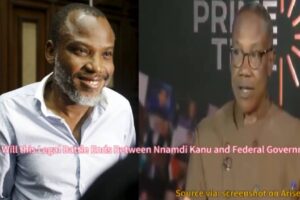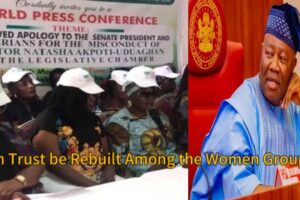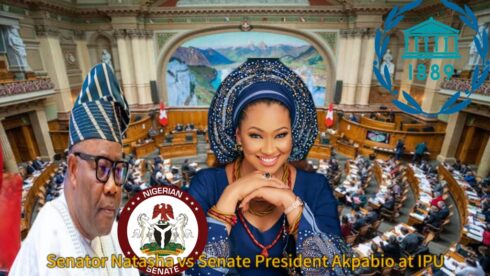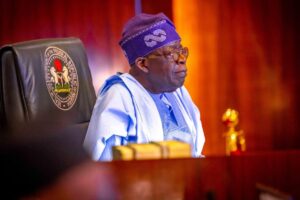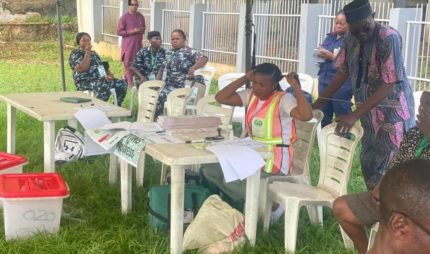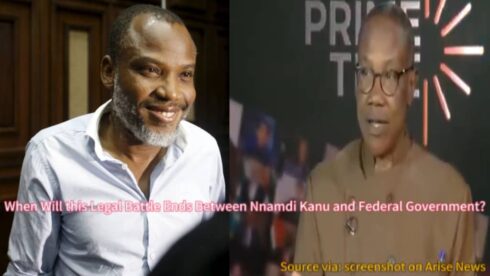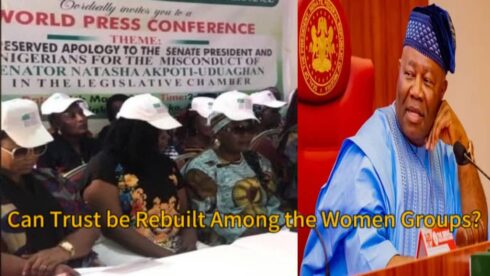As Ondo State voters from 18 local government areas prepare to return to the polls, the political landscape is taking shape, with 17 candidates vying for the governorship seat. This election will determine the future of incumbent Governor Lucky Aiyedatiwa and former Deputy Governor Agboola Ajayi. With over two million registered voters, interest is high, and several critical factors will likely shape the outcome of this highly anticipated election.
Division Among Akeredolu’s Supporters
The legacy of late Governor Rotimi Akeredolu, who passed away in December 2023, casts a long shadow over the upcoming election. Known for his influence and popularity, Akeredolu served as governor under the All Progressives Congress (APC) and enjoyed a significant following among Ondo State residents. Typically, one might expect Akeredolu’s supporters to rally behind Governor Aiyedatiwa, the APC candidate, as Aiyedatiwa seeks to continue his predecessor’s legacy.
However, recent developments indicate a split in Akeredolu’s loyalists. The Akeredolu family, along with ASEI Human Rights of Nigeria, publicly endorsed Otunba Bamidele Akingboye, the Social Democratic Party (SDP) candidate. This move may fragment the APC base, which could weaken Aiyedatiwa’s position. If Akeredolu’s supporters shift their allegiance to Akingboye, it could significantly impact the APC’s chances of retaining power in Ondo State.
Alliance Between Aiyedatiwa and Mimiko
Another intriguing dynamic in this election is the alliance between Governor Aiyedatiwa and former Governor Olusegun Mimiko. Mimiko, a two-term governor and influential political figure in Ondo, has historically aligned with the People’s Democratic Party (PDP). This cross-party alliance between Aiyedatiwa (APC) and Mimiko has generated considerable discussion and interest.
Mimiko’s backing could provide Aiyedatiwa with a significant advantage, especially as Mimiko’s loyalists might support the incumbent governor’s bid to stay in office. This unusual collaboration could attract voters who appreciate Mimiko’s impact on the state and value the stability Aiyedatiwa promises. The extent of this alliance’s influence remains to be seen, but it undoubtedly positions Aiyedatiwa favorably among voters seeking continuity and progress.
Influence of Candidates’ Strongholds
A candidate’s regional stronghold plays a vital role in Nigerian elections, and Ondo is no exception. Historically, areas with high voter turnout can sway election results, and candidates will likely focus on consolidating their influence in these regions. In the last election, APC’s Aiyedatiwa drew strong support from Ilaje Local Government, recording 37,785 votes, whereas PDP’s Ajayi received significant backing in Ese Odo with 18,063 votes.
The geographic voting pattern reveals that Aiyedatiwa may benefit if he successfully mobilizes Ilaje voters once more. However, PDP will aim to secure its support base across other strongholds. Previous election data suggests that APC’s hold on local governments like Odigbo, Okitipupa, and Owo could offer Aiyedatiwa a strategic advantage. For Ajayi, maximizing voter turnout in Ese Odo and other PDP-leaning areas, such as Akure South, will be crucial to closing the gap.
Candidates’ Profiles and Political Experience
Though 17 candidates are in the running, the Ondo election is largely seen as a contest between APC’s Lucky Aiyedatiwa and PDP’s Agboola Ajayi. Each candidate brings unique credentials and appeals to distinct voter groups. Aiyedatiwa, a businessman and politician from Obe-Nla in Ilaje, is the current acting governor and campaigns on a platform of stability and continuity, which may resonate with voters looking for consistent leadership.
Conversely, Ajayi, a former deputy governor and experienced politician from Ese Odo, ran for governor under the Zenith Labour Party (ZLP) in 2020 and now represents the PDP. His emphasis on economic transformation appeals to voters dissatisfied with the status quo. As these two candidates vie for the top seat, their backgrounds, policies, and political reputations will play a significant role in swaying undecided voters.
Zoning Settlements and Regional Dynamics In Ondo State
In Nigeria, informal zoning arrangements often influence election outcomes, especially to ensure fair representation across regions. Ondo State comprises three senatorial districts: Ondo North, Ondo South, and Ondo Central. Traditionally, voters consider the geographic origins of candidates to promote balanced regional governance. However, this election sees both leading candidates, Aiyedatiwa and Ajayi, hailing from Ondo South, which could sway voters who favor diversity in representation.
With the late Governor Akeredolu having represented Ondo North, some residents may advocate for candidates from the remaining districts to uphold equitable power-sharing. This potential preference for regional diversity adds a complex dimension to the voting process, especially with both leading contenders coming from the same senatorial district. This unique zoning situation could either consolidate or split voter loyalty across Ondo South.
Legacy of Akeredolu’s Former Deputies
The fact that both Aiyedatiwa and Ajayi served as deputies to Governor Akeredolu is a unique aspect of this election, creating an unusual rivalry rooted in their shared history. Ajayi was Akeredolu’s deputy from 2017 to 2021 but left APC due to differences and ran against Akeredolu in 2020. In contrast, Aiyedatiwa, who took office as deputy in 2021, maintained a positive relationship with Akeredolu until the latter’s passing in 2023.
This shared background as Akeredolu’s deputies may lead his supporters to split between the two. Aiyedatiwa’s strong ties with Akeredolu could endear him to loyalists, while Ajayi’s history of defiance might attract those seeking change. Voters’ perception of these candidates’ legacies and relationships with Akeredolu will likely shape their choices on election day.
Eyitayo Jegede’s Endorsement and PDP Unity
Eyitayo Jegede, the PDP’s former candidate who came close to defeating Akeredolu in the last election, is a crucial figure in this race. Jegede’s support within the PDP base remains strong, and his endorsement of Ajayi earlier this year could help unify a previously fragmented party. Jegede’s influence could attract supporters who might have been hesitant to back Ajayi due to past intra-party tensions.
With Jegede’s endorsement, Ajayi stands to gain credibility and strengthen his base, which could be pivotal in boosting voter turnout for PDP. This unity within PDP could intensify the competition, especially if Jegede’s followers rally behind Ajayi, providing him with the momentum needed to challenge the incumbent governor’s re-election bid.
Federal Influence Under Tinubu’s Administration
President Bola Tinubu’s political influence and the federal government’s support could also shape the Ondo gubernatorial race. Though Tinubu secured victory in the 2023 presidential election, his party lost some key southwestern states. To bolster his 2027 re-election prospects, Tinubu is keen to solidify APC’s control in southwest Nigeria, making Ondo a strategic priority.
Federal backing from Tinubu could give Aiyedatiwa a competitive edge in this race. However, with current economic challenges under Tinubu’s administration, including rising inflation and cost of living, some voters may express discontent with APC by shifting their support. Tinubu’s influence could thus be a double-edged sword, simultaneously providing support for Aiyedatiwa while also risking backlash from dissatisfied constituents.
As Ondo State heads toward this pivotal election, these factors – from Akeredolu’s legacy to federal influence – will likely decide the
outcome. For both Aiyedatiwa and Ajayi, understanding these dynamics will be crucial as they navigate the race for Ondo’s governorship.
Table of Contents
Discover more from OGM News NG
Subscribe to get the latest posts sent to your email.



